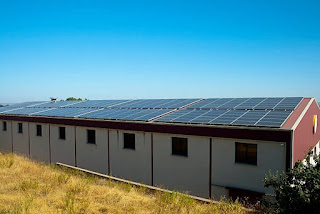Unplugging from the Grid: Embracing Freedom with Off-Grid Solar Power Systems"
In a world dominated by interconnected power grids, the concept of off-grid living powered by solar energy is gaining momentum. Off-grid solar power systems are not just a sustainable alternative; they represent a lifestyle choice that brings independence, environmental consciousness, and resilience to the forefront. Let's delve into the world of off-grid solar power and explore the transformative power it holds for individuals seeking a life unburdened by traditional energy constraints.
Embracing Energy Independence
Off-grid solar power systems free individuals and communities from reliance on centralized power grids. These systems generate electricity through solar panels, harnessing the abundant energy of the sun. By disconnecting from the grid, users gain control over their energy production, consumption, and costs. This newfound independence fosters a sense of self-sufficiency and resilience, especially in remote or rural areas where grid connectivity is a challenge.
Components of an Off-Grid Solar Power System
Solar Panels: At the heart of the system, solar panels convert sunlight into electricity. Advances in solar technology have led to more efficient and durable panels, maximizing energy capture.
Charge Controller: This component regulates the flow of electricity from the solar panels to the batteries, preventing overcharging and ensuring the batteries' longevity.
Batteries: Deep-cycle batteries store the solar-generated electricity for later use, providing power during periods of low sunlight or at night.
Inverter: Responsible for converting DC electricity from the batteries into AC, the inverter makes the power compatible with common household appliances and electronics.
Monitoring System: Many off-grid systems include monitoring tools to track energy production, consumption, and battery levels, empowering users to optimize their energy usage.
Sustainability and Environmental Impact
Off-grid solar power systems significantly reduce the environmental footprint associated with energy consumption. By relying on clean, renewable energy from the sun, users contribute to lower carbon emissions, mitigating the impacts of climate change. Off-grid living becomes synonymous with eco-friendly choices, fostering a deeper connection with nature and a commitment to preserving the environment for future generations.
Resilience in the Face of Challenges
Off-grid solar power systems provide a reliable and resilient energy source, particularly in areas prone to power outages or natural disasters. The independence from centralized grids ensures a continuous power supply, offering a lifeline during emergencies. This resilience is crucial for individuals and communities seeking to maintain essential services and communication channels even in challenging circumstances.
The Off-Grid Lifestyle
Choosing an off-grid solar power system is more than a technical decision; it's a lifestyle choice. It encourages a mindful approach to energy consumption, promoting energy efficiency and conservation. Living off the grid invites a closer relationship with the environment, encouraging practices such as water conservation, waste reduction, and sustainable living that align with the principles of ecological balance.
Off-grid solar power systems represent a paradigm shift in the way we approach energy consumption. Beyond being a practical solution for areas without access to traditional grids, they embody a philosophy of independence, sustainability, and resilience. As we navigate a future shaped by environmental challenges, off-grid living powered by solar energy stands as a beacon of hope, offering a path toward a more sustainable and self-reliant world.



Comments
Post a Comment